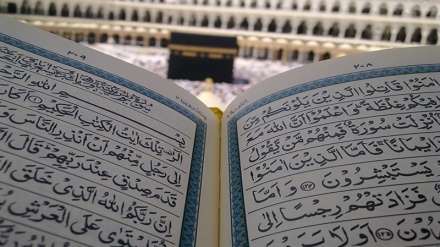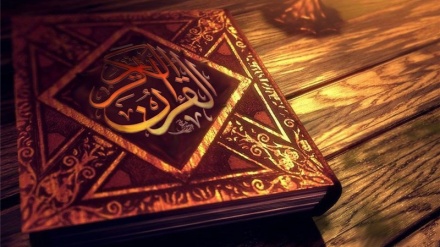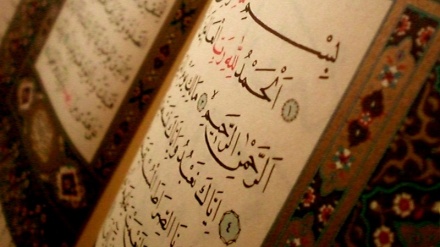Path towards Enlightenment (1048)
Welcome to our latest episode of “Path towards Enlightenment”, which is an endeavor to make you and us familiar with an easy and fluent explanation of God’s Final Scripture to all mankind, the Holy Qur’an that was revealed to the Last and Greatest of all Messengers, Prophet Mohammad (Blessings of God upon him and his progeny).
Last week we started explanation of Surah Muddassir, the 74th in order of compilation of the Holy Qur’an. It has 56 Ayahs and was revealed in Mecca as commandment for public proclamation of the message of monotheism without fear of the ringleaders of the pagan Arabs who were conspiring against the Prophet’s secret preaching of Islam. It opens by addressing the Prophet as “Muddassir” or the “One Wrapped in a Mantle”. It warns the obstinate disbelievers of their fate on the Day of Judgment and a specific opponent of the Prophet is singled out in Ayah 11. Towards its end the Surah exposes the foolishness of the disbelievers’ attitude to Divine Revelation and the Day of Resurrection.
It is narrated from the Prophet’s 5th Infallible Heir, Imam Mohammad Baqer (Peace upon Him) that whoever recites Surah Muddassir in the obligatory ritual prayers, shall be elevated to accompany the Prophet and will be immune from the misfortune in this worldly life, provided he/she pays precise attention to its contents and acts upon them.
We continue from where we left you last Friday and here are Ayahs 15, 16, 17, 18, 19, and 20:
“Still he is eager that I should give him more.
“No indeed! He is an obstinate opponent of Our signs.
“Soon I will overwhelm him with hardship.
“Indeed, he reflected and decided.
“Perish he, how he decided!
“Again, perish he, how he decided!"
If you might recall, in our previous episode of Path towards Enlightenment, we explained the Divine condemnation of Waleed bin Mughayrah, who was one of the avowed rejecters of Islam, a sworn enemy of the Prophet, and a thanklessly avaricious mischief-maker, in spite of the fact that he had been granted wealth, health, children, and social prestige by the Almighty Creator. He used to call the Prophet of Islam a magician and discouraged people from hearing the recitation of the Holy Qur’an. A pagan to his very core, in the end he died in utter misery, disgrace and poverty, witnessing against his wishes the acceptance of Islam by three of his sons. Such types of obstinate deniers of truth are found in every age, and we should be cautious of their mischief.
The Ayahs that we recited to you now are Divine condemnation of Waleed bin Mughayrah and his negative characteristics that made him crave for more wealth. Here God Almighty seals his fate by warning of the hardship to afflict him because of his mockery of Divine Signs and his gathering of pagans to devise sinister plots against the Prophet. The Ayahs point out that as the principal evil brain he used to reflect on his satanic inclinations and decide what blasphemous words should be used against the Prophet. For such devilish decisions the Divine Wrath of “Perish” for him resounds in Ayahs 19 and 20.
From these Ayahs we learn that:
- Greed and thanklessness brings about the downfall of the wealthy.
- The obstinate pagan Waleed bin Mughayrah is cited as an example of the negative nature of those whose thirst for wealth never quenches even if the entire world happens to fall to their share.
- A faithless person, even if smart and proud of the sharpness of his mind to devise devilish plans against truth and the believers, never succeeds.
- Imprecation towards the avowed enemies of faith and pronouncing curse upon them, are necessary in order to expose their blasphemous designs.
Now let us listen to Ayahs 21, 22, 23, 24, and 25 of the same Surah:
“Then he looked;
“Then he frowned and scowled;
“Then he went away disdainfully,
“Saying, 'It is nothing but magic handed down.
“It is nothing but the speech of a human being.'"
These Ayahs continue to focus on the crafty pagan Waleed bin Mughayrah who despite knowing the flawless wisdom of the Holy Qur'an, refused to accept the truth, and after thinking in his devilish mind how to reject it, he disdainfully called it the magical words of a mere human being. He tried to unify the pagans of Mecca against Islam, but having failed in his designs he frowned, scowled, and accused the Prophet’s preaching of monotheism and virtue to guide the people towards God Almighty, as bewitching words that lead to separation between men and women, masters and slaves, and parents and children.
These Ayahs teach us that:
- We should not be negligent of the plots and stratagems of the enemies of Islam because their devilish brains are always planning against truth and how to harm believers.
- The obstinate disbelievers arrogantly consider themselves as superior and rightful, while depriving others of their rights.
- The flawless eloquence and timeless wisdom of the Holy Qur'an makes the obstinate disbelievers speechless, and that's why they call it as magic.
In conclusion of this week’s episode of Path towards Enlightenment, here are Ayahs 26, 27, 28, 29, and 30 of Surah Muddassir:
“Soon I shall cast him into Saqar.
“And what will show you what is Saqar?
“It neither spares nor leaves [anything].
“It burns the skin.
“There are nineteen [keepers] over it."
The Arabic word “Saqar” refers to the most scorching and lowest part of hell where obstinate disbelievers like Waleed bin Mughayrah who never stopped their devilish designs to try to insult the Prophet, distort truth, and prevent people from accepting Islam, will be thrown. The fire in Saqar burns not just the skin but the entire body including the soul. The terrible torment of hellfire neither takes the life of the condemned persons nor does it keep them alive, but they are entangled all the time in a state between life and death.
Elsewhere, the Holy Qur'an has mentioned that whenever the body of the inmates of hell burns, new skin and flesh grows to burn again, and this torment continues all the time.
As Ayah 30 says, there are 19 angels of Divine Wrath keeping constant watch over the disbelievers and deniers of truth burning in hellfire.
From these Ayahs we learn the following points:
- It is not possible to properly understand the torments of the various parts of hell, other than what God Almighty has revealed in the Holy Qur’an and what the Prophet and his Infallible Heirs have elaborated on Divine command.
- Both body and soul will be resurrected on the Day of Judgment, which means, the true believers shall fully enjoy and taste the bounties of Paradise, while those cast in hell undergo punishments and tortures.
RM/AS/ME


